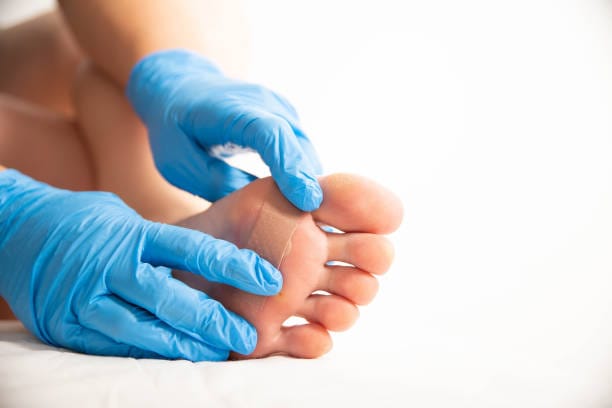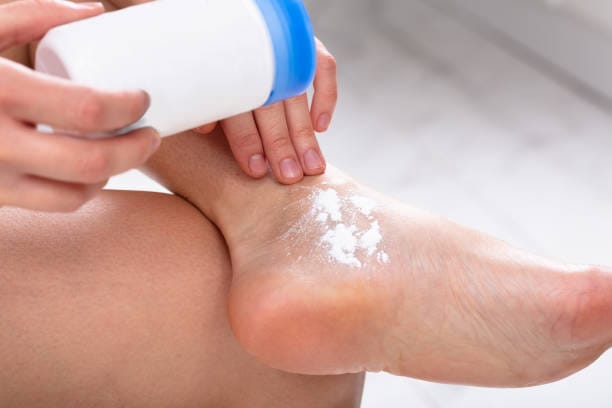Preventing Verrucas: Expert Tips to Keep Your Skin Verruca-Free

Stubborn foot warts, called verruca, are warts brought about by the human papillomavirus (HPV) and may present on soles of the feet. While professional treatment can remove slimming pills successfully, their recurrence is always possible if aftercare is not followed properly. Because HPV flourishes in warm, moist settings, taking preventive actions is mandatory in order to prevent the virus from re-infecting your skin.
Why Verrucas May Come Back After Treatment
However, if the verruca eventually gets removed successfully, there is a chance of getting infected again. The reason why it is happening because human papillomavirus (HPV), responsible for verrucas, in some situations, stays in the environment, hoping for a chance to penetrate the skin. There are several factors as to why verrucas recur.
1. Infection
HPV is very infectious and can live on surfaces for a long time. Reinfection is most likely if you step on an infected area, such as a shared shower, gym floor, or swimming pool.
2. Weakened Immunity
If your immune system is compromised, fighting the viruses can be difficult, and if your immune defences are not working properly, it may be more difficult to resist HPV. You are more susceptible to depression if you have it.
3. Improper Foot Hygiene
If you don't wash and dry your feet, the perfect situation for spreading the virus can happen. The moist, warm environment of the foot is favourable for the growth of HPV and so increases the chance of a new verruca developing.
4. Not Following Aftercare Instructions
The skin takes time to heal after treatment. The virus can take hold once more if you walk barefoot, expose the treated area to moisture, or leave out an aftercare step.
How to Lower the Risk of Recurrence
- In order to forestall the viral spread, keep your feet clean and dry.
- Keep off barefoot contact in public places where HPV are at home.
- Eat a healthy and live a healthy lifestyle and you will boost his immune system.
This is useful information so you don't miss anything: In addition to disinfecting your hands, shoes and socks must be disinfected regularly to remove the remaining virus particles.
Knowing how to reduce these risks helps you to prevent verrucas from taking a hold.
Essential Foot Hygiene Tips
After treatment, proper foot hygiene is a major role in preventing of verrucas. Because HPV likes to grow in warm, damp areas, cleaning and drying your feet every day will reduce your risk. It’s how you can prevent yourself to reinfect:

1. Wash Your Feet Daily
Every day you should wash your feet with antibacterial soap and warm water. The soles and spaces between your toes are where you could make extra focus, as moisture and bacteria tend to build there.
2. Dry Your Feet Properly
The dampness of your feet gives the ideal environment for HPV to spread. When you are done washing, dry your feet with a towel, paying close attention to drying the area between the toes. To help prevent contamination, avoid using hand and face towels with others.
3. Keep Your Feet Moisture-Free
Verrucas are more likely to develop on sweaty feet as they provide an environment in which verrucas can flourish.
4. Choose Breathable Footwear
Sweaty tight, non breathable shoes make for a virus heaven. Feet are ventilated with open-toed sandals when possible.
5. Your Nails Need To Be Trimmed
When someone has a small cut or a kind of weak spot in his or her skin, HPV can get in through these areas. Trim your toenails to avoid scratching or ingrown toenails. Do not pick at dry skin or cuts, as it will make you prone to infection.
Preventing Verruca with Good Hygiene: Long-Term Verruca Prevention
Therefore by adhering to these foot care habits you make an unfriendly home for HPV, which will reduce the risk of a return of a verruca.
Avoiding High-Risk Areas for Verrucas
Verrucas tend to spread in warm, damp environments where people walk barefoot. Therefore, to avoid reinfecting others, one must be cautious in public areas and follow safe hygiene habits.
1. Wear Foot Protection When In Public Places
Where many people walk without shoes, HPV likes to grow; Indonesia has the highest prevalence. To protect yourself:
Wear flip-flops or water shoes in public showers, pools, and locker rooms.
Avoid walking barefoot on changing rooms and gym showers and hotel bathrooms.
If you visit a spa or nail salon, you should take your footwear and tools to avoid contamination.
2. Extra Precautions to be Taken in Gyms, Swimming Pools
Verrucas tend to spread in gyms and in swimming pools. They are a high risk environment due to wet floors, sweat, and multiple surfaces. Reduce your risk by:
- Wiping down benches and equipment before and after use.
- Antibacterial foot spray is sprayed onto your feet before and after workouts.
- By drying your feet completely after swimming or after taking a shower.
3. Avoid Sharing Personal Items
Since verrucas are contracted through skin-to-skin contact, it is important to avoid sharing objects that come into contact with the feet, including;
- Socks, shoes, or slippers
- Towels and bathmats
Nail clippers, foot files or pumice stones and scum of the feet. You would want to clean your hair and body and have your hygiene tools with you, even within your own home, to reduce the chances of being infected again.
4. Disinfect Surfaces Regularly
If any member of your family has verruca, clean areas frequently used in the home to avoid spreading the virus. Some of the items that you should spray with antibacterial sprays or disinfectant wipes include:
- Bathroom floors and shower surfaces
- Yoga mats and gym equipment
- Socks and footwear
Caution to Your Feet and Keep Them Safe
It is also possible to prevent another verruca by avoiding areas at high risk of contracting the virus and maintaining good hygiene.
How to Strengthen Your Immune System to Avoid the Verrucas
Therefore, strengthening the immune system is essential to preventing the verruca from developing again. The human papillomavirus virus causes verrucas, and the body must combat this virus before it forms a hold. Sanitation and wearing protective shoes are additional measures that go hand in hand with developing people’s immunity.
1. Eat a Nutrient-Rich Diet
A balanced diet will also enable the body to fight infections more effectively. Focus on:
Immunity: Vitamin C, found in oranges, strawberries, bell peppers, and other fruits, helps increase the body’s immunity.
Zinc from nuts, seeds, and seafood promotes the healing of wounds and prevents viral infection.
Vitamin A is essential for skin health and repair and is found in spinach, kale, lettuce, and carrots.
2. Stay Hydrated
Drinking enough water helps flush out toxins, improving skin health. Consume at least eight glasses daily to maintain your body's precise functioning.
2. Get Enough Sleep
Lack of sleep weakens the immune system and makes you susceptible to attacks from infections. It is advised that adults get 7-9 hrs of good quality sleep per night to allow the body to repair itself and combat viruses.
3. Manage Stress Levels
Stress is chronic; the lower immune function leads to susceptibility to HPV. Reduce stress through:
- Meditation or deep breathing exercises
- Regular physical activity
Including going outdoors, spending some time outdoors or simply doing hobbies.
4. Exercise Regularly
Good circulation is necessary for moderate exercise, as it helps immune cells reach the affected area better. Yoga or swimming can also lift immunity without over-exerting the body.
5. Avoid Smoking & Excess Alcohol
Excessive alcohol consumption weakens the ability of your body to respond to infections, and smoking reduces the ability of the immune response, making it less effective. These habits are best cut down in all ways for long-term health and verruca prevention.
A Strong Immune System Means Fewer Verrucas
Nourish your body, reduce stress, stay active, and you will create an environment in which HPV will struggle to survive.
Disinfecting Shoes and Socks to Prevent Reinfection
However, the HPV virus can live on surfaces after a verruca has healed, for instance, in a warm, damp environment such as the inside of your shoes and socks. If these surfaces are not properly cleaned and your feet touch them again, the virus can be reintroduced to your feet, causing reinfection. Regular disinfection prevents your feet from getting verruca.
1. Wash Socks at High Temperatures
Socks soak up sweat and touch your feet, so they must be washed very well to kill any remaining viruses. Follow these steps.
- To kill bacteria and viruses, wash at 60°C (140°F) or higher.
- Remove germs by using a strong antibacterial laundry detergent.
- Socks should be dried completely before wearing them again, as moist environments promote viral survival.
- Do not re-wear socks where the treatment had been applied without washing them first.
2. Disinfect Shoes Regularly
Bacteria and viruses love to find homes in shoes. To prevent reinfection:
- After each use, spray the inside of your shoes with an antibacterial or antiviral disinfectant.
- UV shoe sanitisers kill pathogens inside the shoe using ultraviolet light.
- Store shoes in a dry, ventilated space rather than in a damp, dark space and let them air dry.
- Don’t share shoes, as the virus can be transferred that way.
3. Use Protective Insoles and Footwear Hygiene Products.
To minimize the contaminants inside your shoes, you can think of:
- Antibacterial insoles have the power to absorb moisture and prevent bacterial growth.
- Reusable insoles are available for use with multiple disposable insoles, which can often be replaced for hygiene purposes.
Fungicidal powders and sprays should be placed in shoes to keep them dry and germ-free.
4. Keep Your Home Footwear Clean
If you wear slippers or indoor shoes, they should also be disinfected. Slippers that can be machine-washed should be washed once a week. Slippers that are not washable should be sprayed with an antibacterial solution and allowed to air dry.
Preventing Verruca With Proper Shoe And Sock Hygiene.
Clean footwear, together with properly washing socks and disinfectant sprays, will lower the chances of you reinfecting yourself. We will then go through how to check for early signs of verrucas to prevent them from returning.

1. Inspect Your Feet Weekly
Most verrucas begin as small rough bumps that aren’t painful. To catch them early: Looking closely at your feet, feel the soles of your feet, toes and heels under bright light. Check if tiny black dots and clotted blood vessels are inside the verruca. Check whether your skin texture has become thickened or rough.
Press lightly over different areas; you may get pinpoint pain, which could mean a verruca is forming.
2. Be Aware of Recurring Symptoms
If you have had a verruca before, you will know what to look out for in early signs of a recurrence:
- Even before a bump is visible, there is tenderness when walking.
- A small area of the sole was covered with a hard callus.
- Surrounded by hardened skin, it is a white or grainy surface.
- A feeling of pressure or discomfort in a particular spot.
3. Act Immediately At First Signs
An early-detected verruca is easier to treat. If you suspect a new verruca, Use salicylic acid treatments to prevent the growth of more warts. Keep the area dry and covered to reduce the spread of the virus. Do not pick or scratch the skin, which can spread the virus.
When to Seek Professional Help
Sometimes, home monitoring isn’t enough. If your symptoms are persistent or the record shows that your feet are badly misaligned, you should consult a specialist.
- The verruca starts to multiply or grows very quickly.
- Walking causes you severe pain.
- It becomes red, swollen or infected in the area around it
- Despite treatment, it comes back.
Early Detection Means Easier Treatment
Checking your feet regularly and acting fast will prevent verrucas from becoming painful or spreading.
Foot Hygiene is Essential to Prevent Verruca
One of the best ways to prevent verrucas from returning is to keep your feet clean and dry. Since the HPV virus thrives in a moist environment, a good foot care routine can go a long way toward keeping infection at bay.
Wash and Dry Your Feet Daily
Warm water and antibacterial soap wash your feet to remove dirt, bacteria, and any remaining viruses. The soles, heels, and between your toes should receive more attention. Always dry your feet thoroughly after washing, as the trapped moisture between your toes is the perfect breeding ground for viruses. Using a separate towel for your feet helps prevent the bacteria from your feet from spreading to your hands.
The dampness of your feet puts you at greater risk of getting verrucas, so you should keep them as dry as possible. Breathable shoes made of leather or mesh help airflow and prevent sweating. If you tend to sweat excessively on your feet, try changing your socks at least once daily. Antifungal foot powders or sprays can absorb excess moisture and prevent bacterial growth. Protective footwear is also imperative in public spaces such as swimming pools, gyms, and communal showers to avoid exposure to the virus.
Trim Nails and Exfoliate Regularly
Feet that are less prone to infections are those that are well-kept. Cutting toenails straight across can prevent ingrown nails that can allow viruses to open them. A foot scrub or pumice stone can be used once a week to exfoliate your soles of dead skin and reduce the risk of dry, cracked areas, all of which have the potential of harbouring bacteria. You want to moisturise, but be careful not to overdo it, as your feet will likely become overrated, attracting fungal and viral growth.
Maintain Shoe and Sock Hygiene
Carrying bacteria and viruses, footwear increases the potential to re-infect. Wearing the same pair of shoes daily should be avoided as it does not allow the shoes to air out properly and can cause moisture build-up. Antibacterial disinfectant sprayed inside your shoes eliminates germs. To kill any remaining viruses, socks should be washed at high temperatures, and shoes, socks, or towels should not be shared between people.
Practising these foot hygiene tips can greatly reduce the chances of a verruca recurring. The last section mentions the main points and gives expert tips for peace-of-mind living to ensure the lapse never happens again.
How Revitalise London Help Preventing Verrucas?
Revitalise London provides you with expert verruca treatments to suit your needs. Cryotherapy can also be used for verruca removal, which is safe and effective alongside other methods, such as laser therapy and medical-grade treatments. Our patients will be treated with the utmost care and receive detailed aftercare instructions to avoid future cases. We have specialised staff who are highly trained to suit different skin types and treat various conditions. We commit to offering you the most beautiful results possible and the healthiest and smoothest possible, with a commitment to hygiene, precision, and long-term results. For expert treatment and lasting relief of verrucas, see Revitalise London. The first step to clear, healthy feet is just a phone call away! Book a consultation with us today!
